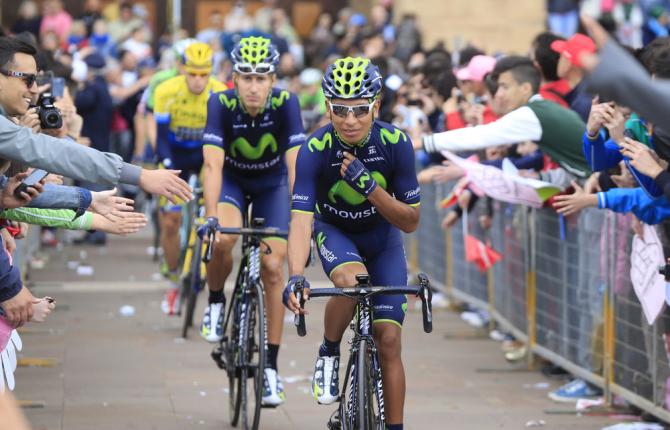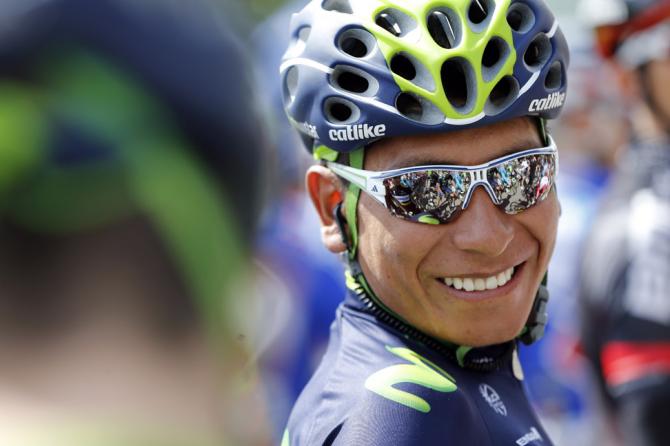Quintana ready for the attack?
Colombian and Giro peloton tackle first full mountain stage on Saturday


When the Giro d'Italia peloton tackles its first full mountain stage on Saturday, all eyes will be on pre-race favourite Nairo Quintana (Movistar), for many fans the most talented young climber in the peloton.
Quintana's Giro has not been straightforward so far. Despite wins in team time trial's in the Vuelta and a near miss, finishing second, in last year's Giro TTT in Ischia, Movistar had to settle for an unremarkable eighth place in Belfast. Then the Colombian was one of several top names who crashed on stage six, suffering multiple minor injuries.
Thanks to the crash, too, he also lost nearly 50 seconds to the stage leaders. And as a result overall Quintana is now eleventh at 2:08 on race leader Michael Matthews (Orica-GreenEdge), with Cadel Evans (BMC), 21 seconds down on Matthews, almost as far ahead of the Colombian on GC, too. But Saturday's mountain stage in central Italy, culminating with the first category Montecopiolo, represents his first big chance to strike back.
"He's got bruises and scratches, today [stage seven] he's sure to be uncomfortable, but hopefully over the next few days he'll be all right" Movistar sports director Jose Luis Arrieta told Cyclingnews at the start of stage seven.
"You can say tomorrow [stage eight] is more suited to him, but every day here is key: just look at yesterday [stage six] and that crash. It's also very important how quickly he recovers from that, too."
"We're still in the first week, and there's a long way to go, even if a lot seems to have happened since Belfast."
Apart from Quintana Movistar have a sizable number of riders with minor injuries from the stage six multiple pile-up, ranging from Andrei Amador, who has neck injuries to Adriano Malori has a knee injury and Gorka Izaguirre's road rash stretching all the way down one side of his body.
Get The Leadout Newsletter
The latest race content, interviews, features, reviews and expert buying guides, direct to your inbox!
"It's quite a list, but what can you expect when 60 percent of the peloton goes down?" Arrieta says. "We all saw it coming, too, but when everybody wants to be in the front, there's all that rain bringing out all the dirt and oil to the surface, it's going to be bad."
Arrieta reflects, "It's always better to have an advantage rather than to be down on time, but the margins as yet are not overly worrying. Of course it's difficult and it's an important time gap and we're racing against a former Tour winner here, and one of the strongest teams in the Giro."
"But there's no way we're throwing in the towel at this point, with two weeks left to race. Little by little we'll go on seeing what we can do, and just as he's been unlucky on several occasions, everybody else may have their moment of bad luck, too and we can take advantage of that."
Arrieta says that he does not believe that there is any need to rake over whether BMC should have stopped or not after the crash. "The circumstances were what they were, they didn't wait and that's all there is to it."
In any case, he did not feel that it would have been a reasonable thing to ask riders, racing flat out at that point, to realise what was happening and decide to stop without any input from their directors - who were already with more than enough on their hands with so many riders to attend to on the ground.
"If they'd stopped and waited, it wouldn't have been a bad thing to do, but the rider is probably the last person who will think about it [stopping] under those circumstances, when they're stressed out because there's just been a huge crash, and the race is full on."
Hopefully Saturday, in any case, will see a very different kind of racing in the 2014 Giro's first incursion into the high mountains.
Alasdair Fotheringham has been reporting on cycling since 1991. He has covered every Tour de France since 1992 bar one, as well as numerous other bike races of all shapes and sizes, ranging from the Olympic Games in 2008 to the now sadly defunct Subida a Urkiola hill climb in Spain. As well as working for Cyclingnews, he has also written for The Independent, The Guardian, ProCycling, The Express and Reuters.
